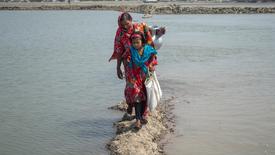Economic Surveillance

The IMF monitors the international monetary system and global economic developments, while also engaging in regular health checks of the economic and financial policies of its 191 member countries. These activities are also known as “surveillance.” The IMF will highlight stability risks to member countries and advise governments on potential policy adjustments. This work supports the international monetary system by facilitating the exchange of goods, services, and capital among countries and in the process sustaining sound economic growth.
The IMF gives country-specific advice through “bilateral surveillance” and provides analysis of the international monetary system and global and regional economic developments through “multilateral surveillance.”
One major change to the practice of IMF surveillance came in April this year when the Board concluded the “2024 Review of Data Provision to the Fund.”This review took place against the backdrop of profound shifts in the global economy, highlighting the importance of adequate macroeconomic and financial data to inform analysis and policymaking. This major, multiyear negotiation resulted in substantial but manageable updates to the data that all member countries will be obliged to provide to the IMF, including in the areas of public sector, foreign exchange intervention, and macro-financial indicators.
In FY 2023/24, the IMF continued to integrate into its work areas such as climate, cyber security, and fintech, which are macro-critical because of their ability to significantly impact economic and financial stability and sustainable growth. One of those areas is gender.Over the past year, the IMF has continued to mainstream gender into its work with the publication of an interim note that provided general guidance on the operationalization of the IMF’s Strategy Toward Mainstreaming Gender. It offered a comprehensive overview of how the IMF staff could integrate macro-critical gender issues not only in the area of surveillance, but also in lending and CD.
Bilateral Surveillance
Bilateral surveillance, or Article IV consultations (so named for the number of the IMF’s founding Articles of Agreement that lays out the requirement) is carried out during IMF team missions to a member country. IMF staff engage in a two-way policy dialogue with country authorities regarding a range of important issues including exchange rates; fiscal, financial, and monetary policies; and structural reforms. Discussions also extend to developments in other areas that are critical for economic and financial stability, such as climate change and digitalization. During IMF missions, staff typically meet with members of the legislature and representatives from business, labor unions, and civil society. In FY 2023/24, the IMF conducted 117 Article IV consultations and 11 financial system stability assessments under the FSAP.
Multilateral Surveillance
As part of its multilateral surveillance, the IMF issues biannual reports and updates on the latest global economic developments: the World Economic Outlook, the Global Financial Stability Report, and the Fiscal Monitor. In-depth analyses of selected and highly topical issues are thematic chapters in these publications. Interim updates on global economic conditions are issued when warranted. In addition, as part of an ongoing effort to provide a rigorous and candid assessment of global excess imbalances and their causes, the External Sector Report is published annually.
The IMF also publishes reports on the outlook for regions. These cover regional policy developments and challenges and provide country-specific analysis. Article IV consultations and financial system stability assessments under the FSAP also discuss issues related to multilateral surveillance, where relevant.
In practice, bilateral and multilateral surveillance inform each other, ensuring a comprehensive and consistent analysis of how one country’s policies affect others; that is, their “spillovers.” In today’s challenging global economic environment, timely and tailored surveillance remains vital. It enables lessons to be shared and provides members with well-calibrated policy advice.
Policy Advice
The IMF Executive Board discusses all aspects of the IMF’s work, from Article IV consultations to policy issues relevant to the global economy. The Board conducts its work based on policy papers prepared by the IMF staff. In FY 2024, the IMF published 61 of these policy papers externally. For a comprehensive list of IMF policy papers issued in FY 2024, please visit the Annual Report website.
Policy Papers
Filtered by All Policy Papers
Continue Reading

Capacity Development
Provide technical assistance and training to help member countries strengthen their economic institutions and implement sound economic policies.

Executive Directors & Management Team
The IMF has a management team and 18 departments that carry out its country, policy, analytical, and technical work.
